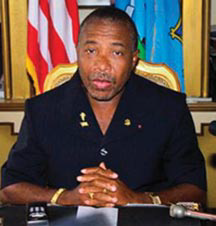
Back Charles Taylor AF تشارلز تايلور (رئيس ليبيريا) Arabic تشارلز تايلور (سياسى من ليبيريا) ARZ Charles Ghankay Taylor AST Çarlz Teylor AZ Чарлз Тэйлар (ліберыйскі палітык) BE Charles Taylor (Liberia) BR Charles Ghankay Taylor Catalan Charles Taylor (politik) Czech Charles Taylor CY
Charles Taylor | |
|---|---|
 Taylor in 2004 | |
| 22nd President of Liberia | |
| In office 2 August 1997 – 11 August 2003 | |
| Vice President | |
| Preceded by | Ruth Perry (Chairperson of the Council of State) |
| Succeeded by | Moses Blah |
| Personal details | |
| Born | Charles McArthur Taylor 28 January 1948 Arthington, Montserrado County, Liberia |
| Political party | National Patriotic (1997–2005) |
| Other political affiliations | People's Redemption Council (expelled in 1983) |
| Spouses |
|
| Domestic partner | Bernice Emmanuel (1977–1979) |
| Children | 14 biological (including Charles), 2 adopted |
| Alma mater | Bentley University |
| Occupation | Former head of state |
| Military service | |
| Allegiance | Liberia |
| Years of service | 1989–2002 |
| Rank | Commander |
| Commands | Liberian Army |
| Battles/wars | |
| Years active | 1997–2003 |
| Conviction(s) | Crimes against humanity including acts of terrorism, murder, atrocities against personal dignity, rape, slavery, mutilation, use of children under the age of 15 in armed forces or groups, or using them to actively participate in hostilities, looting and other inhumane acts |
| Criminal penalty | 50 years in prison |
| Details | |
| Victims | Over 100,000 |
Date apprehended | 29 March 2006 |
| Imprisoned at | HM Prison Frankland |
| ||
|---|---|---|
|
Rebel leader President of Liberia
Post-Presidency  |
||
Charles McArthur Ghankay Taylor (born 28 January 1948) is a Liberian former politician and convicted war criminal who served as the 22nd president of Liberia from 2 August 1997 until his resignation on 11 August 2003 as a result of the Second Liberian Civil War and growing international pressure.[1][2]
Born in Arthington, Montserrado County, Liberia, Taylor earned a degree at Bentley College in the United States before returning to Liberia to work in the government of Samuel Doe. After being removed for embezzlement and imprisoned by President Doe, Taylor escaped prison in 1989. He eventually arrived in Libya, where he was trained as a guerrilla fighter. He returned to Liberia in 1989 as the head of a Libyan-backed rebel group, the National Patriotic Front of Liberia, to overthrow the Doe government, initiating the First Liberian Civil War (1989–1996). Following Doe's execution, Taylor gained control of a large portion of the country and became one of the most prominent warlords in Africa.[3] His forces, along with those of other rival warlords such as ULIMO were notorious for committing widespread human rights abuses and atrocities during the civil war. Following a peace deal that ended the war, Taylor was elected president in the 1997 general election as a member of the National Patriotic Party (NPP).[4]
During his term of office, Taylor was accused of war crimes and crimes against humanity as a result of his support for the Revolutionary United Front (RUF) rebel group in the Sierra Leone Civil War (1991–2002). Domestically, Taylor attempted to consolidate power through dictatorial means such as by purging the military and committing violence against his political rivals, including an assassination attempt of former ULIMO commander Roosevelt Johnson, leading to violent clashes in Monrovia in 1998. As a result, opposition to his government grew, culminating in the outbreak of the Second Liberian Civil War in 1999. By 2003, Taylor had lost control of much of the countryside and was formally indicted by the Special Court for Sierra Leone. That year, he resigned, as a result of growing international pressure; he went into exile in Nigeria. In 2006, the newly elected President of Liberia, Ellen Johnson Sirleaf, formally requested his extradition. He was detained by UN authorities in Sierra Leone and then at the Penitentiary Institution Haaglanden in The Hague, awaiting trial by the Special Court.[5] He was found guilty in April 2012 of all eleven charges levied by the Special Court, including terror, murder and rape.[6]
In May 2012, Taylor was sentenced to 50 years in prison. Reading the sentencing statement, Presiding Judge Richard Lussick said: "The accused has been found responsible for aiding and abetting as well as planning some of the most heinous and brutal crimes in recorded human history."[7]
- ^ Quist-Arcton, Ofeibea (11 August 2004). "Liberia: Charles Ghankay Taylor, Defiant And Passionate to the End". allAfrica.com. Retrieved 18 January 2008.[permanent dead link]
- ^ Agencies (11 August 2004). "Liberian president Taylor steps down". The Guardian. ISSN 0261-3077. Retrieved 28 February 2020.
- ^ "Justice at last?". The Economist. 31 May 2007. Retrieved 5 August 2007.
- ^ Onishi, Norimitsu (7 December 2000). "In Ruined Liberia, Its Despoiler Sits Pretty". The New York Times.
- ^ Cendrowicz, Leo (14 July 2009). "'Lies and Rumors': Liberia's Charles Taylor on the Stand". Time. Archived from the original on 17 July 2009. Retrieved 14 July 2009.
- ^ "Taylor Sierra Leone war crimes verdict welcomed". BBC. 26 April 2012. Retrieved 1 May 2012.
- ^ "Charles Taylor sentenced to 50 years for war crimes". CNN. 31 May 2012. Retrieved 9 June 2012.
